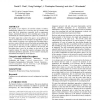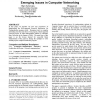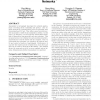EMNETS
2007
14 years 4 months ago
2007
Currently, there is a lack of stand-alone geo-monitoring systems for harsh environments that are easy to configure, deploy and manage, while at the same time adhering to science g...
VRST
2000
ACM
14 years 4 months ago
2000
ACM
In this paper we present the work undertaken by the Advanced Interfaces Group at the University of Manchester into the design and development of a system to support large numbers ...
SPAA
2010
ACM
14 years 5 months ago
2010
ACM
In this work, we address Byzantine agreement in a message passing system with homonyms, i.e. a system with a number l of authenticated identities that is independent of the total ...
SIGCOMM
2003
ACM
14 years 5 months ago
2003
ACM
We propose a new objective for network research: to build a fundamentally different sort of network that can assemble itself given high level instructions, reassemble itself as re...
PODC
2004
ACM
14 years 5 months ago
2004
ACM
We explore the computational power of networks of small resource-limited mobile agents. We define two new models of computation based on pairwise interactions of finite-state ag...
ACMSE
2005
ACM
14 years 6 months ago
2005
ACM
In this paper, we describe our first year experiences of administering the NSF-supported Research Experiences for Undergraduates program award. Emerging issues in computer network...
NETGAMES
2006
ACM
14 years 6 months ago
2006
ACM
This paper presents our ongoing research activity to design and implement a framework for an networked virtual environment (NVE) that efficiently supports both hardware and softwa...
MIDDLEWARE
2007
Springer
14 years 6 months ago
2007
Springer
We present a flexible framework for throttling attackers in peerto-peer media streaming systems. In such systems, selfish nodes (e.g., free riders) and malicious nodes (e.g., DoS ...
CCS
2007
ACM
14 years 6 months ago
2007
ACM
Anonymity is increasingly important for network applications concerning about censorship and privacy. The existing anonymous communication protocols generally stem from mixnet and...
MOBIQUITOUS
2008
IEEE
14 years 6 months ago
2008
IEEE
The big challenge related to the contemporary research on ubiquitous and pervasive computing is that of seamless integration. For the next generation of ubiquitous and distributed...



